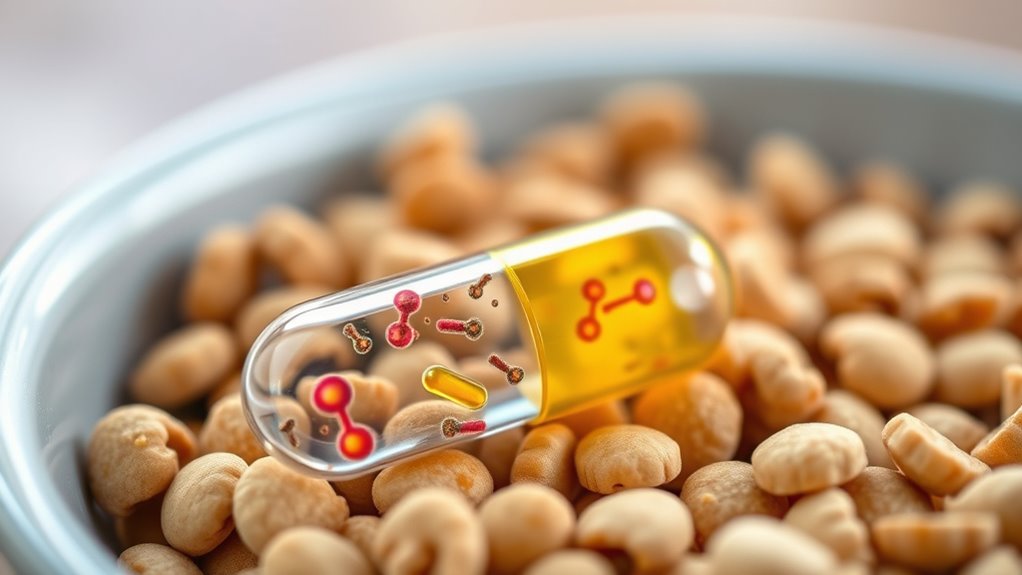Understanding the science of canine probiotics shows that these supplements contain beneficial bacteria that support your dog’s digestion and immune health. They work by enhancing microbial diversity in the gut, helping break down nutrients and fight off harmful bacteria. Scientific studies confirm that proper probiotic strains can restore gut balance and boost overall health. If you want to learn how these advanced formulations are tailored for your dog’s wellbeing, keep exploring this fascinating topic.
Key Takeaways
- Canine probiotics contain beneficial bacteria that support digestion and boost immune function by surviving stomach acid to reach the intestines.
- A diverse and balanced gut microflora is essential for overall dog health, aiding nutrient absorption and resisting pathogens.
- Scientific studies show targeted probiotic strains improve microbial diversity, reduce gastrointestinal issues, and enhance immune responses in dogs.
- Proper formulation, including strain diversity and quality testing, is critical for probiotic effectiveness and long-term health benefits.
- Advances like machine learning enable personalized probiotic development based on individual microbiomes for optimal canine health.
What Are Canine Probiotics and How Do They Work?

Canine probiotics are supplements containing beneficial bacteria that support your dog’s digestive health. These probiotics work by enhancing microbial diversity in your dog’s gut, which helps maintain a healthy balance of good bacteria. The effectiveness of a probiotic depends on its formulation, including the specific strains of bacteria and their viability. A well-designed probiotic formulation guarantees that these beneficial microbes survive stomach acid and reach the intestines where they can do their work. By introducing these healthy bacteria, probiotics can improve digestion, reduce gastrointestinal upset, and strengthen your dog’s immune response. Choosing a probiotic with diverse strains and a proven formulation can make a significant difference in maintaining your dog’s overall gut health. Additionally, recent advances in machine learning algorithms are being utilized to develop more targeted and effective probiotic formulations based on individual canine microbiomes. Understanding the specific gut microbiome composition can further optimize probiotic effectiveness. Furthermore, ongoing research highlights the importance of strain specificity in selecting probiotics for different health outcomes.
The Role of Gut Microflora in Dog Health

Your dog’s gut microflora plays a vital role in maintaining overall health by supporting digestion and strengthening immunity. When this balance is disrupted, it can lead to digestive issues or increased vulnerability to illnesses. Understanding these effects helps you keep your dog healthy and happy. A balanced microflora also relies on microbial diversity to ensure optimal functionality and resilience against pathogens. Furthermore, probiotics can help restore and maintain this diversity, promoting a healthier gut environment. Additionally, maintaining a healthy lifestyle can positively influence gut microflora, further supporting your dog’s well-being. Incorporating mindfulness techniques such as deep breathing exercises can also reduce stress, which positively impacts gut health and overall wellness.
Gut Microflora Balance
A balanced gut microflora is essential for maintaining overall health in dogs, as it plays a critical role in digestion, immune function, and nutrient absorption. When your dog’s gut microflora has good microbial diversity, it supports gut health and prevents harmful bacteria from dominating. Achieving this balance involves maintaining a healthy diet, avoiding unnecessary antibiotics, and possibly supplementing with probiotics. A diverse microflora ensures efficient digestion and better nutrient uptake. If the balance tips, your dog might experience digestive issues or decreased immunity. Regularly monitoring and supporting gut health helps keep the microflora balanced. Remember, a stable gut microflora promotes overall well-being and longevity for your furry friend. Ensuring microbial diversity through proper care can significantly impact your dog’s health. Additionally, understanding how gut microflora interacts with the immune system can help in developing better health strategies for your pet. Incorporating targeted probiotics can further support these beneficial microbial populations and enhance overall gut health.
Immunity and Digestion
Gut microflora plays a crucial role in supporting a dog’s immune system and digestion. When your dog consumes dietary fibers, these fibers act as fuel for beneficial bacteria, promoting bacterial diversity in the gut. A diverse microbial community enhances the breakdown of nutrients, ensuring your dog absorbs essential vitamins and minerals effectively. This bacterial diversity also stimulates immune responses, helping defend against pathogens. A healthy gut microflora balances immune activity and reduces inflammation, keeping your dog resilient against illnesses. By nourishing the good bacteria with dietary fibers, you support optimal digestion and strengthen immunity. This microbial diversity is fundamental for maintaining overall health, vitality, and well-being. Proper probiotics and a fiber-rich diet work together to foster a robust, diverse gut microflora, which is essential for gut health and immune support. Additionally, understanding the importance of yarn for scarves can be useful for pet owners interested in handmade accessories or gifts for their dogs.
Effects of Disruption
Disruptions to the balance of gut microflora can substantially impact a dog’s health and well-being. When harmful bacteria overrun beneficial ones, your dog might experience digestive issues, decreased immunity, or behavioral changes. Such disruptions can make stress management and behavior modification more difficult, as a stressed gut affects overall mood. You may notice signs like diarrhea, bad breath, or lethargy. Stress from illness or antibiotics can strip beneficial bacteria, worsening health problems. Restoring balance helps improve digestion and mood. Supporting gut health through probiotics can prevent these issues, fostering resilience against disruptions. Maintaining a stable microflora balance is essential for your dog’s long-term health, behavior stability, and overall happiness. A healthy gut means a healthier, happier dog.
Types of Beneficial Bacteria in Dog Probiotics

You’ll find that certain probiotic strains are especially beneficial for your dog’s health. These bacteria aid digestion and help strengthen the immune system. Understanding the common types can help you choose the right probiotic for your pet’s needs. Additionally, selecting strains that are compatible with your dog’s specific health conditions can optimize their benefits, much like choosing the appropriate headphone jack for your devices ensures proper functionality. Recognizing the importance of data privacy challenges in technological applications can also inform how you select and administer probiotics to ensure safe and effective use. Incorporating knowledge about nutritional components of supplements can further enhance your pet’s health strategy. For example, considering the Volkswagen Tuning concepts can help you appreciate how precise modifications can improve performance, similar to tailoring probiotic strains to your dog’s unique microbiome.
Common Probiotic Strains
Several probiotic strains are commonly included in dog supplements because they offer targeted benefits for your pet’s digestive health. These strains enhance microbial diversity, which is crucial for balanced probiotic formulations. Knowing the specific bacteria can help you choose the right supplement for your dog’s needs. Here are some popular strains:
- *Lactobacillus acidophilus*: Supports digestion and immune response.
- *Bifidobacterium animalis*: Promotes gut health and reduces inflammation.
- *Lactobacillus reuteri*: Helps restore microbial balance after antibiotics.
- *Enterococcus faecium*: Assists with stool consistency and overall gut function.
- *Lactobacillus plantarum*: Contributes to immune support and nutrient absorption.
These common strains are often included because they effectively contribute to a healthier, more resilient canine gut.
Bacteria for Digestion
Have you ever wondered which beneficial bacteria truly support your dog’s digestion? These bacteria play a key role in fermentation processes that break down food and absorb nutrients efficiently. The most common types include Lactobacillus and Bifidobacterium, known for their ability to enhance digestion and maintain gut health. Bacterial diversity is essential because different strains target various digestive functions, ensuring a balanced microbiome. Some bacteria help digest fiber, while others neutralize harmful substances or produce vitamins. When selecting a probiotic, look for strains that promote this diversity, as a varied bacterial community supports a resilient and healthy digestive system. Supporting bacterial diversity through diverse beneficial bacteria can further enhance your dog’s gut health and nutrient absorption, especially when incorporating probiotic strains tailored to specific digestive needs. Additionally, incorporating strain-specific probiotics can help target particular digestive issues more effectively. Understanding the microbiome balance within your dog’s gut can also lead to better overall health outcomes.
Immune System Boost
Beneficial bacteria in dog probiotics play a crucial role in strengthening your dog’s immune system. They enhance microbial diversity, which is key for robust immune modulation. By supporting the balance of good bacteria, these probiotics help your dog fend off infections and reduce inflammation. Incorporating a probiotic with diverse strains ensures your dog’s immune system stays resilient and responsive, helping them stay healthier longer. Dual-flush toilet system can serve as an analogy for how diverse bacterial strains work together to optimize overall health. Ensuring the probiotic includes features like proper size and dimensions can improve the effectiveness of the supplement in supporting your dog’s immune responses. Additionally, understanding the science of sound healing can provide insights into how subtle vibrations may influence gut health and immune function.
How Probiotics Can Aid Digestion and Nutrient Absorption

Probiotics play a essential role in supporting your dog’s digestion by balancing the gut bacteria responsible for breaking down food. When microbial diversity increases, it helps create a more resilient and efficient digestive system. This diversity promotes the production of digestive enzymes, which are indispensable for breaking down proteins, fats, and carbs. With a healthy probiotic balance, your dog can absorb nutrients more effectively, leading to better energy levels and overall health. Probiotics also help prevent harmful bacteria from overpopulating the gut, which can interfere with digestion. By supporting a diverse microbial community, probiotics guarantee that your dog’s digestive processes run smoothly, optimizing nutrient absorption, and promoting a healthier, happier life. Additionally, maintaining proper indoor air quality can help support your pet’s overall well-being and respiratory health.
The Impact of Probiotics on a Dog’s Immune System

Since a strong immune system is vital for your dog’s overall health, supporting it through gut health is essential. Probiotics help enhance microbiome diversity, which strengthens your dog’s immune response by promoting beneficial bacteria. This increased diversity improves the body’s ability to fight off infections and reduces inflammation. When choosing probiotics, probiotic safety is crucial; ensure the supplement is from reputable sources and free from harmful additives. A balanced microbiome not only boosts immunity but also helps prevent allergies and other immune-related issues. Regular probiotic use can lead to a more resilient immune system, keeping your dog healthier and happier. Remember, consistency and quality are key to unlocking the full immune-boosting benefits of probiotics.
Signs Your Dog Might Benefit From Probiotics

If your dog is experiencing frequent digestive issues, it might be a sign they could benefit from probiotics. Poor digestion can hinder puppy growth and lead to nutrient deficiencies. You may notice diarrhea, constipation, or gas more often than usual. Additionally, if your dog shows signs of canine allergies, such as itching, skin irritation, or ear infections, probiotics might help support their immune response. Dogs with persistent gastrointestinal discomfort or allergic reactions often have imbalanced gut bacteria. Incorporating probiotics could restore this balance, improving digestion and reducing allergy symptoms. Keep an eye out for these signs, as they indicate your dog’s gut health may need support. Addressing these issues early can promote healthier puppy growth and overall well-being.
Choosing the Right Probiotic Supplement for Your Dog

Choosing the right probiotic supplement for your dog can make a significant difference in their gut health and overall well-being. To do this, consider the supplement’s probiotic storage requirements—some need refrigeration, while others are shelf-stable. Check the dosage guidelines carefully; giving the correct amount guarantees effectiveness without overdoing it. Look for strains specifically beneficial for dogs, and choose reputable brands with transparent ingredient lists. Remember, consistency is key to seeing benefits. Here are some tips to help you select the right probiotic:
- Verify storage instructions and guarantee proper storage
- Follow dosage guidelines precisely
- Select strains proven for canine health
- Opt for reputable, transparent brands
- Monitor your dog’s response and adjust if needed
Scientific Studies Supporting Canine Probiotic Use

Numerous scientific studies have demonstrated the benefits of probiotics for dogs, providing evidence that these supplements can improve digestive health and bolster the immune system. Research into the canine microbiome has shown that a balanced gut flora is essential for overall well-being. Advances in probiotic manufacturing guarantee that quality strains reach pets effectively, supported by rigorous testing and clinical trials. Canine microbiome research highlights how specific probiotic strains can restore microbial diversity, reducing issues like diarrhea and gastrointestinal upset. These studies confirm that well-formulated probiotics support digestion and immune function, making them a scientifically backed addition to your dog’s health regimen. As research continues, it’s clear that probiotics hold a crucial role in maintaining prime health for dogs.
Incorporating Probiotics Into Your Dog’S Daily Routine

Incorporating probiotics into your dog’s daily routine can be straightforward and highly beneficial for their health. Consistent use supports digestion, immune function, and overall well-being. To make it easier, consider these tips:
- Add probiotic powder or capsules to your dog’s food during regular meals.
- Incorporate probiotics into your dog training sessions as positive reinforcement rewards.
- Schedule veterinary visits to discuss probiotic options and ensure proper dosage.
- Use probiotic treats as part of your daily bonding and training routines.
- Keep a consistent feeding schedule to maximize probiotic effectiveness and reduce gastrointestinal upset.
Frequently Asked Questions
Are Canine Probiotics Safe for Puppies and Senior Dogs?
You may wonder if canine probiotics are safe for puppies and senior dogs. Generally, they can support puppy health and senior wellness when given appropriately. Always check with your veterinarian first, especially for puppies with developing immune systems or senior dogs with health issues. Proper probiotic use helps maintain gut balance, boosts immunity, and promotes overall well-being, making them a safe addition to your dog’s routine when used correctly.
Can Probiotics Prevent or Treat Specific Dog Health Conditions?
You might wonder if probiotics can prevent or treat specific dog health conditions. While they support gut health and immune support, they’re not a cure-all. Probiotics can help manage issues like diarrhea or allergies by balancing gut bacteria and strengthening immunity. However, always consult your vet before starting probiotics, as they’re most effective when tailored to your dog’s unique needs and health conditions.
How Long Does It Take to See Results From Probiotics in Dogs?
When you start giving your dog probiotics, the duration expectations for seeing symptom improvement can vary. Usually, you might notice positive changes within a week or two, but for some conditions, it could take up to a month. Be patient and consistent with the treatment. Regular use supports your dog’s gut health and helps achieve the best results, so monitor their progress and consult your vet if needed.
Are There Natural Food Sources of Probiotics for Dogs?
You can provide your dog with natural sources of probiotics through fermented foods like yogurt, kefir, or sauerkraut, which contain beneficial live bacteria. Additionally, incorporating dietary fibers such as pumpkin, sweet potatoes, and carrots helps support healthy gut bacteria. These natural foods can boost your dog’s digestion and overall health, making them a great supplement to their diet alongside probiotic supplements.
Do Probiotics Interact With Other Medications or Supplements?
Like a puzzle piece fitting into place, probiotics can interact with medications or supplements you give your dog. You need to be aware of potential drug interactions and supplement compatibility, as some combinations might diminish effectiveness or cause side effects. Always consult your vet before adding probiotics to your dog’s regimen, especially if they’re on other medications or supplements, to ensure safe and effective use.
Conclusion
By adding probiotics to your dog’s daily routine, you’re planting seeds of health that blossom with every meal. Think of their gut as a bustling city—healthy bacteria are the busy workers keeping everything running smoothly. When you choose the right probiotics, you’re nurturing a vibrant ecosystem that boosts digestion, strengthens immunity, and fosters overall well-being. Embrace this natural harmony, and watch your furry friend thrive like a garden in full bloom.










